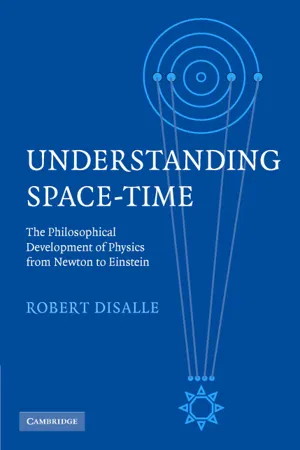
Understanding Space-Time
The Philosophical Development of Physics from Newton to Einstein
- English
- PDF
- Available on iOS & Android
Understanding Space-Time
The Philosophical Development of Physics from Newton to Einstein
About this book
Presenting the history of space-time physics, from Newton to Einstein, as a philosophical development DiSalle reflects our increasing understanding of the connections between ideas of space and time and our physical knowledge. He suggests that philosophy's greatest impact on physics has come about, less by the influence of philosophical hypotheses, than by the philosophical analysis of concepts of space, time and motion, and the roles they play in our assumptions about physical objects and physical measurements. This way of thinking leads to interpretations of the work of Newton and Einstein and the connections between them. It also offers ways of looking at old questions about a priori knowledge, the physical interpretation of mathematics, and the nature of conceptual change. Understanding Space-Time will interest readers in philosophy, history and philosophy of science, and physics, as well as readers interested in the relations between physics and philosophy.
Frequently asked questions
- Essential is ideal for learners and professionals who enjoy exploring a wide range of subjects. Access the Essential Library with 800,000+ trusted titles and best-sellers across business, personal growth, and the humanities. Includes unlimited reading time and Standard Read Aloud voice.
- Complete: Perfect for advanced learners and researchers needing full, unrestricted access. Unlock 1.4M+ books across hundreds of subjects, including academic and specialized titles. The Complete Plan also includes advanced features like Premium Read Aloud and Research Assistant.
Please note we cannot support devices running on iOS 13 and Android 7 or earlier. Learn more about using the app.
Information
Table of contents
- Cover
- Half-title
- Title
- Copyright
- Dedication
- Contents
- Figures
- Preface
- chapter 1 Introduction
- chapter 2 Absolute motion and the emergence of classical mechanics
- chapter 3 Empiricism and a priorism from Kant to Poincaré
- chapter 4 The origins and significance of relativity theory
- chapter 5 Conclusion
- References
- Index